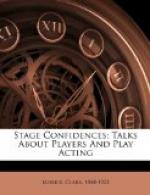We had retired from the breakfast room and were arranging our plans for the day, when a sort of whirlwind came rushing through the hall, the door sprang open almost without a pronounced permission, and Madame F—— flung herself into the room, caught my hands in hers, pressed them to her heart, to her lips, to her brow, wept in German, in French, in English, and called distractedly upon “Himmel!” “Ciel!” and “Heaven!” But she found her apologies so coldly received by my friends that she was glad to turn the flood of her remorse in my direction, and for very shame of the scene she was making I assured her the mistake was quite pardonable—as it was. It was her manner that was almost unpardonable. Then she added to my discomfort by bursting out with fulsome praise of me as an actress; how she had seen me and wept, and so on and on, she being only at last walked and talked gently out of the room.
But that was not the end of her remorse. A truly French bouquet with its white paper petticoat arrived in about an hour, “From the so madly mistooken Madame F——,” the card read, and that act of penance was performed every morning as long as I remained in Paris. But one day she appealed to the Colonel for pity and sympathy.
“Ah!” said she, “I hav’ zee two tr’ubles, zee two sorrows! I hav’ zee grief to vound zee feelin’s of zat so fine actrice Americaine—zat ees one tr’ubles, und den I hav’ zee shame to mak’ zat grande fool meestak’—oh, mon Dieu! I tak’ her for zee maid, und zare my most great tr’uble come in! I hav’ no one with zee right to keek me—to keek me hard from zee back for being such a fool. I say mit my husband dat night, ‘Vill you keek me hard, if you pleas’?’ Mais, he cannot, he hav’ zee gout in zee grande toe, und he can’t keek vurth one sou!—und zat is my second tr’uble!”
Behind her broad back the Colonel confessed that had she expressed such a wish on the occasion of the mistake, he would willingly have obliged her, as he was quite free from gout.
So any woman who goes forth to win her living as an actress will at least be spared the contemptuous treatment bestowed on me in my short service as an amateur lady’s maid.
CHAPTER XIII
THE BANE OF THE YOUNG ACTRESS’S LIFE_
What is the bane of a young actress’s life?
Under the protection of pretty seals stamped in various tints of wax, I find one question appearing in many slightly different forms. A large number of writers ask, “What is the greatest difficulty a young actress has to surmount?” In another pile of notes the question appears in this guise, “What is the principal obstacle in the way of the young actress?” While two motherly bodies ask, “What one thing worries an actress the most?” After due thought I have cast them all together, boiled them down, and reduced them to this, “What is the bane of a young actress’s life?” which question I can answer without going into training, with one hand tied behind me, and both eyes bandaged, answer in one word—dress. Ever since that far-away season when Eve, the beautiful, inquiring, let-me-see-for-myself Eve, made fig leaves popular in Eden, and invented the apron to fill a newly felt want, dress has been at once the comfort and the torment of woman.




